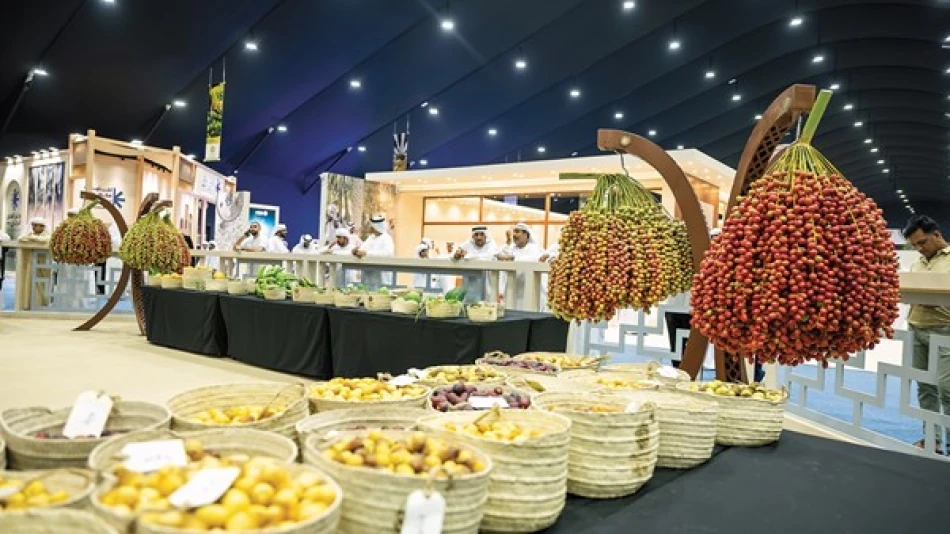
Lively Crowds Flock to Liwa Date Festival: A Vibrant Celebration of Emirati Heritage
UAE's Liwa Date Festival Transforms Into Agricultural Innovation Hub, Boosting Local Food Security
The 21st edition of the Liwa Date Festival has evolved far beyond a traditional agricultural competition into a comprehensive platform driving innovation in UAE's palm cultivation sector. With date fruit quality improvements of over 130% since the festival's inception and prize money reaching 397,000 dirhams, the event demonstrates how strategic investment in agricultural heritage can deliver measurable economic and food security benefits.
From Heritage Event to Agricultural Catalyst
What began as a simple date competition has transformed into a sophisticated agricultural development program that brings together farmers, researchers, and industry leaders. Obaid Khalfan Al Mazrouei, Executive Director of Festivals and Events at the Abu Dhabi Heritage Authority, emphasized that the festival now serves as a "complete agricultural heritage celebration" rather than merely a showcase event.
The transformation reflects a broader Gulf strategy of leveraging cultural events to drive economic diversification and food security. Similar to Saudi Arabia's agricultural initiatives and Qatar's food security programs, the UAE is using traditional knowledge as a foundation for modern agricultural innovation.
Measurable Agricultural Improvements
Quality Standards Drive Innovation
The festival's judging criteria have created a powerful incentive structure for farmers to improve their cultivation methods. The weight requirement for date samples has become a key performance indicator, with dramatic results:
When the festival began, 50 date fruits typically weighed around 300 grams. Today, the same quantity exceeds 700 grams, while 100 fruits now weigh over 1.5 kilograms. This represents a productivity increase of more than 130%, demonstrating how competition-driven standards can accelerate agricultural development.
Expanded Competition Categories
The current edition features 12 date competitions within 24 total categories, focusing on seven premium varieties: Dabbas, Khalas, Fard, Khanaizi, Bu Maan, Shishi, and Zamli. The festival has also introduced regional competitions for the Dhafra and Liwa elite categories, plus specialized contests for Al Ain region farms.
Prize adjustments reflect a more strategic approach to farmer incentives. Elite category requirements have been reduced from 15 to 10 varieties for Liwa and from 20 to 15 for Dhafra, making participation more accessible while maintaining quality standards.
Economic Impact and Investment Strategy
Substantial Prize Pool Drives Participation
The festival's financial commitment underscores its economic importance. The Dabbas and Khalas categories each offer 446,000 dirhams across 25 winners, with first place receiving 100,000 dirhams. This substantial investment in prize money creates meaningful economic incentives for agricultural innovation.
More than 53 farms participated in the prestigious Dabbas competition alone, indicating strong farmer engagement. The Dabbas variety, which represents 50% of palm cultivation in the Dhafra region and produces over 80% of the area's total date output, exemplifies the festival's focus on economically significant crops.
Regional Economic Development
The festival serves as an economic catalyst for the remote Dhafra region, attracting thousands of visitors annually to an area that might otherwise struggle with economic diversification. This model mirrors successful agricultural tourism initiatives in California's Central Valley and Australia's wine regions, where rural festivals drive broader economic development.
Technology Integration and Modern Conveniences
The provision of free internet access throughout the festival grounds reflects the UAE's commitment to digital integration in traditional sectors. This connectivity enables real-time sharing of agricultural innovations, market information, and best practices among participants.
The digital infrastructure also supports the festival's role as a knowledge-sharing platform, allowing international visitors and researchers to document and disseminate innovations in palm cultivation techniques.
Strategic Implications for Food Security
The festival's success demonstrates how cultural heritage can be leveraged to address modern challenges like food security and agricultural sustainability. By improving date production quality and quantity, the UAE is strengthening its position in a crop where it has natural advantages while reducing dependence on food imports.
The emphasis on local production and quality improvement aligns with broader Gulf food security strategies, particularly important given regional climate challenges and supply chain vulnerabilities exposed during recent global disruptions.
This approach offers a replicable model for other nations seeking to modernize traditional agriculture while preserving cultural heritage, showing how strategic investment in agricultural competitions can deliver measurable economic and food security benefits.
Most Viewed News

 Layla Al Mansoori
Layla Al Mansoori






